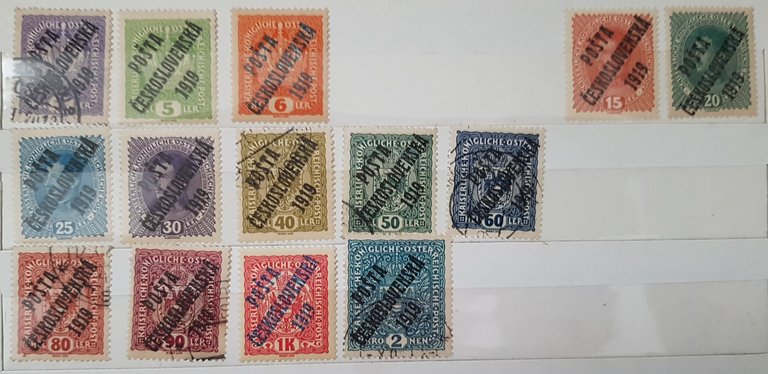
I was born in 1967. In the last millennium. The world was a very different place then. No one back then thought there would ever be an internet, multiple computers in every home, and cell phones in our pockets.
When we needed to communicate with someone, we had a landline and letters or postcards.
We stuck stamps on letters and postcards. There used to be different stamps for newspaper deliveries and airmail. It was a wonderful time for girls and boys. Practically all of us collected stamps. It was so tempting to peel off stamps, organize them in albums into series and exchange them with each other!
Today, we communicate via email and text messages. The stamps have remained a collector's item for a few elderly gentlemen and ladies. Kids today collect various collectible cards, like Pokemons.
I was looking for something today and got my hands on my old stamp albums. I decided to share a few pictures of the stamps and stories associated with them.

On October 28, 1918, a revolution took place in my country. The Habsburg monarchy was overthrown and an independent state was established, which eventually became a republic. The revolution...
The revolution was prepared down to the smallest detail. The old authorities handed over the government to the new authorities without resistance. Bands took to the streets and celebrations began.
The new provisional Parliament began to pass laws that had long been prepared. Details. For example, new stamps were drafted. These stamps were issued about two months after the revolution.
The new coins and banknotes came out later, because the revolutionaries could not agree on the name of our new currency. But that's for another time.
However, it turned out that the post office still had a large stock of old monarchist stamps. What to do with them? Our revolutionaries were thrifty, so the old stamps were put back into circulation with an overprint.
The first picture shows the republican stamps and the second the monarchist ones with the overprint.

History is full of paradoxes. In less than 21 years, in 1939, my country was occupied by Nazi Germany. New stamps had to be issued. But there were still plenty of old ones in the post offices. So they started reprinting again.

Now a philatelic conclusion. You have noticed that some stamps are unused, others used, i.e. stamped. Different collectors specialize differently. Some also collect whole letters.
In 1939 we had original stamps, overprinted stamps and new stamps. Different stamp combinations were created on the letters. These combinations are of interest to some collectors. I show some of the combinations here.
As always with my photographs, they all show exclusively my possessions. (And they are not very good photographically.)

Again, this article wasn't about silvergoldstacking. But when I use the hashtag #silvergoldstackers, I think I get a bigger following. Does that bother anyone?
Thanks for reading and for all forms of support.
I used Deepl.com Translator to translate it into English. Here is the original Czech:
O známkách a budoucnosti
Narodil jsem se v roce 1967, v minulém tisíciletí. Svět tehdy vypadal úplně jinak. Nikoho tehdy nenapadlo, že bude existovat nějaký internet, že prakticky každá domácnost bude vybavena několika PC a po kapsách nám budou zvonit mobilní telefony a v brašnách budeme nosit tablety a notebooky.
Když jsme s někým potřebovali komunikovat, měli jsme k dispozici pevnou linku (ne všichni, v komunistických zemích to byla sledeovaná strategická záležitost) a dopisy nebo pohlednice.
Na dopisy a pohlednice jsme lepily známky. Na doručované noviny a pro leteckou poštu bývaly zase jiné známky. Byla to krásná doba pro holky a kluky. Prakticky všichni jsme zmámky sbíral. Bylo to tak lákavé známky odlepovat, pořádat si je v albech do sérií a vzájemně si je vyměňovat!
Dnes komunikujeme prostřednictvím e-mailu a textových zpráv. Známky zůstaly sběratelským artiklem pro několik starších pánů a dam. Děti dnes sbírají různé sběratelské kartičky, například Pokémony.
Dnes jsem něco hledal a dostala se mi do ruky moje stará alba se známkami. Rozhodl jsem se podělit se o pár obrázků známek a příběhů, které se k nim vážou.
- října 1918 proběhla v mé zemi revoluce. Habsburská monarchie byla svržena a vznikl nezávislý stát, který se nakonec stal republikou. Revoluce...
Revoluce byla do nejmenších detailů připravená. Staré úřady bez odporu předaly vládu novým orgánům. Do ulic vyšly kapely a začalo se slavit.
Nový prozatimní Parlament začal schvalovat dávno připravené zákony. Detaily. Byly napříkla připraveny návrhy nových známek. Tyto známky byly vydány asi 2 měsíce po revoluci.
Nové mince a bankovky vyšly později, protože se revolucionáři nemohli dohodnout, jak se naše nová měna bude jmenovat. Ale o tom třeba někdy jindy.
Ukázalo se ale, že pošta má ještě velké zásoby starých monarchistických známek. Co s nimi? Naši revolucionáři byli šetrní, a tak se staré známky vrátily do oběhu s přetiskem.
Na prvním obrázku jsou republikánské známky a na druhém ty monarchistické s přetiskem.
Historie je plná paradoxů. Za necelých 21 let, v roce 1939, byla moje země okupována nacistickým Německem. Musely být vydány nové známky. Ale na poštách bylo stále dost starých. A tak se začalo znovu přetiskovat.
Teď takový filatelistický závěr. Všimli jste si, že některé známky jsou nepoužité, jiné použité, tedy orazítkované. Různí sběratelé se specializují různě. Někteří také sbírají celé dopisy.
V roce 1939 u nás platily známky původní, známky s přetiskem a známky nové. Na dopisech vznikaly různé známkové kombinace. Tyto kombinace jsou předmětem zájmu některých sběratelů. Některé kombinace tady ukazuji.
Jako vždycky u mých fotografií, všechny zobrazují výhradně můj majetek. (A nejsou fotograficky příliš dobré.)
Tenhle článek zase nebyl o silvergoldstackingu. Ale když použiji hashtag #silvergoldstackers, tak si myslím, že mám větší sledovanost. Vadí to někomu?
Děkuji za přečtení a za všechny formy podpory.

The stamps of a country are like a class of history. We can go through its marked moments, its most important characters, places and monuments, even its flora and fauna. Whenever I see a philatelic collection, that nostalgic spirit invades me, remembering how different communication was just a couple of decades ago. But I also remember the uncertainty of waiting for news from distant friends for days or weeks. Any past tense was... previous. 😁 Thanks for sharing your little philatelic treasure.
I have picked this post on behalf of the @OurPick project! Check out our Reading Suggestions posts!
Please consider voting for our Liotes HIVE Witness. Thank you!
Thank you for stopping by. I'll check out the links.
You received an upvote of 95% from Precious the Silver Mermaid!
Thank you for contributing more great content to the #SilverGoldStackers tag.
You have created a Precious Gem!
Congratulations @trautenberk! You have completed the following achievement on the Hive blockchain And have been rewarded with New badge(s)
Your next target is to reach 100 posts.
Your next target is to reach 8000 upvotes.
You can view your badges on your board and compare yourself to others in the Ranking
If you no longer want to receive notifications, reply to this comment with the word
STOPCheck out our last posts:
Stamps don't bother me at all.
Stamps are like banknotes.
The Collectable Shows I attend have both coins and stamps so they seem natural together. Local shops here do carry both products. Like coin collecting, Stamp collecting has declined in popularity. I saw my Dealer offered stamp collections for sale and he often declines buying them or sellers giving them up on the very first offer. He makes most of his business in buying & selling bullion now.
The old collectors knew that their collections would lose value if they did not develop successors. That's why the old collectors also went to schools and offered to run stamp collecting clubs for free. But today is a different time.
Low-value and mediocre stamps are losing value. But the exceptionally rare and unique stamps retain their value or, on the contrary, their value increases.
I like stamps!
I've been collecting U.S. Stamps for decades... Some date back pretty far...
Later I'll show some 150-year-old postcards, letters from the front and from prison camps in World War I and II, letters from Nazi prisons. We still have a lot of that in the attics in Central Europe.